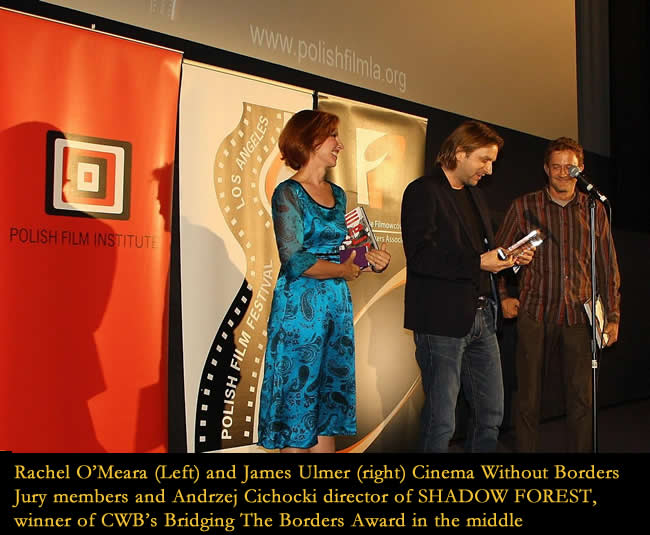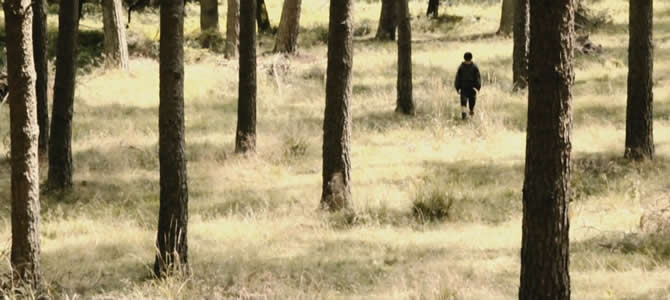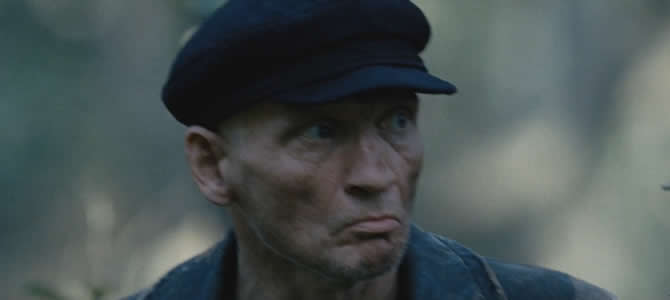 THE SHADOW FOREST directed by Andrzej Cichocki won Cinema Without Borders Bridging The Borders Award for the Best Short Film at 2015 Polish Film Festival, Los Angeles.
THE SHADOW FOREST directed by Andrzej Cichocki won Cinema Without Borders Bridging The Borders Award for the Best Short Film at 2015 Polish Film Festival, Los Angeles.
Here is the jury statement: “Cinema Without Borders Bridging The Borders Award for the Best Short Film at Polish Film Festival, Los Angeles goes to a film that shows that fear does not know any borders. Man has shared the fear of being hunted over the centuries and just in tragedy of those looking for a better place to live.
The winner our award uses the language of filmmaking at its best to show this universal feeling with no words used. The winner of Cinema Without Borders Bridging The Borders Award for the Best Short Film at Polish Film Festival, Los Angeles is Shadow Forest by ANDRZEJ CICHOCKI”
In THE SHADOW FOREST a man, while hunting a wolf in a sinister forest, is startled by the sound of guns firing. Suddenly, there are people running, one of whom, a small boy, gets lost. Even the wolves are overwhelmed by a sense of the impending danger.
Bijan Tehrani: How did you come up with the idea of making THE SHADOW FOREST and what was your main motivation to make it?
Andrzej Cichocki: THE SHADOW FORES is a Memory. A Memory presented in a symbolic short narrative film, which is my reflection on the terrible times of war.
When I think about the horrible time of the Second World War, and the Holocaust, it touches me deeply. I wanted to make a film about that. Short films are often being watched by young people, and let that film be kind of a symbolic warning that we should remember always to build a world free of wars and racism.
Another aspect of film is the main protagonist, who is enmeshed in war. Every war puts people in extreme situations, it’s time of massive ravage in people’s hearts and minds.
BT: THE SHADOW FOREST has different layers of stories which makes it a challenging film to make, how did you overcome the challenges and made a film that does not lose the balance between stories it has to tell?
AC: Short films are the most difficult to make… and when you tell a story without dialogue it’s a great challenge the more when you want to make a deep, significant movie. The film is so symbolic and figurative, that’s true, with different layers, I hope that’s the power of the film, makes it universal. I wanted the viewer not only to stop his hand of eating popcorn during watching the film, but I wanted him to feel kind of catharsis, to start thinking, I mean I wanted the film to exist in the viewer’s mind for a long time when he would leave the cinema. I realized actually and I hope it can be perceived as a poem which is not an entertainment but a spiritual experience.
BT: Did you had a complete screenplay before you start to shoot the film? Or you left room for improvisation?
AC: When I wrote the screenplay, I had in my mind a specific vision of the film, the symbolism, emotions, and mystery. I always leave some room for not maybe improvisation, but kind of searching, which motivates me to think and focus about the narration, context and the substance of the film, from the very moment of writing the script to the very final moments of editing or postproduction.
BT: THE SHADOW FOREST tells a story that goes beyond a certain location and time, was this intentional?
AC: Yes, however it’s about the Holocaust, the storyline is universal and symbolic.
BT: How did you come up with the visual style of the film?
AC: I decided to make that movie without dialogue underlining the cinematography. The storyline happens in a beautiful forest, beautiful nature, what intentionally is in contrast to the tragedy. The cinematography seemingly creates the atmosphere of fairy story, which virtually heightens the narrative tension and terror in viewer’s mind. That makes also the film more figurative in every scene, for instance in the scenes with wolves, that heighten the mystery, which you cannot explore unambiguously.
BT: You are writer, cinematographer and director of the THE SHADOW FOREST, didn’t you take a risk of confusing artistic control over your film doing all three, specially being director and cinematographer at the same time?
AC: You know…it’s a challenge, but the beauty of that situation is that you are a totally free artist, you compose the film with your only rhythm and feeling. It’s not confusing, because you have your inner vision, and you know that every decision is supposed to make your film more coherent and perfect. Normally it’s not possible, maybe even not desirable, because it’s a real challenge and burden, but when you make a film, when you do not deal with big producers with big money, you can experiment, you can listen only to your heart… that’s the beauty of such moments of creativity in your life.
BT: Please tell us about casting of your film.
AC: Poacher is played by Pawel Tchorzelski an actor from Horzyca Theatre in the city of Torun. Pawel Tchorzelski is a total actor…I’m sure Jerzy Grotowski would had invited him to his plays at once. When I am looking for actors I have the vision of the character, which I search, and sometimes it takes a lot of time but I’m inexorable. But when I had the meeting with Pawel in Torun after ten seconds I knew he was the perfect actor for that role. I was not mistaken.
The Boy is played by Michal Bonin, very modest, great boy, who played perfectly, and it’s worth mentioning, the character had to be very persuasive to play real the emotions of such tragic events.
BT: Do you think Polish Film Festival, Los Angeles can help promoting Polish Cinema in US?
AC: I hope so. It’s a great Festival, because you can focus on modern Polish films, which represent not always an easy entertainment but significant and wise thoughts and Polish soul. I think it’s a great occasion to present also masterpieces of Polish great filmmakers, for example Andrzej Wajda, Krzysztof Kieslowski, Wojciech Jerzy Has, Krzysztof Zanussi and many other.
BT: How do you feel about winning Cinema Without Borders’ Bridging The Borders Award for the best Polish Short Film?
AC: That’s a great honor. We live in not perfectly peaceful time, and the world is still affected by conflicts and innocent people suffer. That’s very sad. I hope the film will be a symbolic memory to everybody to avoid such tragedies which we know from history to bridge the borders to make the world more peaceful.
BT: What is your next project?
AC: I just finished my next thirty minutes short Supernova, and now I’m writing feature scripts and preparing to direct one, one day, hopefully soon! If you know about a producer who would search for a director let me know, but remember I’m only interested in making significant, great films changing the world…[laughing]

